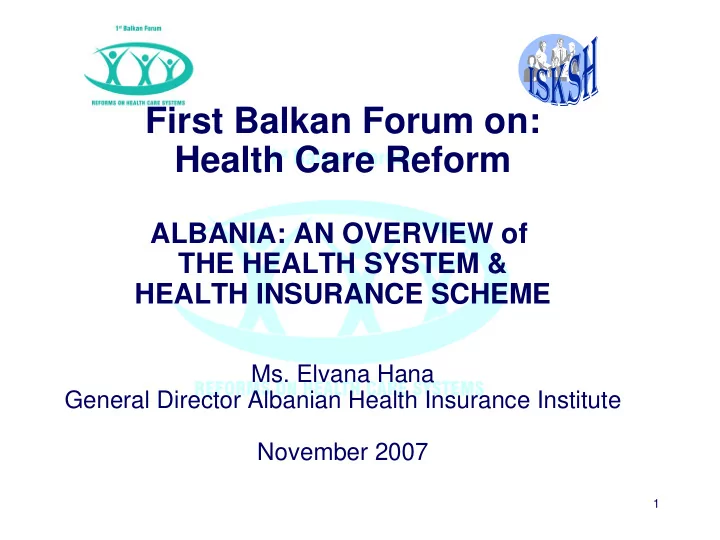

First Balkan Forum on: Health Care Reform ALBANIA: AN OVERVIEW of THE HEALTH SYSTEM & HEALTH INSURANCE SCHEME Ms. Elvana Hana General Director Albanian Health Insurance Institute November 2007 1
Albania has an evolving health care system • Health services in Albania are delivered by a mix of public and private providers – Hospital services are primarily provided by the MOH and other public bodies – PHC is provided through a network of GP’s with increasing levels of private ownership planned for this sector – Pharmacies, dentists and other auxiliary health services have been fully privatized for some time • The Ministry of Health remains the key policy maker and regulator of the health sector • Municipal Governments also retain some involvement in the health sector at regional level 2
Albania’s health delivery and financing structure MOF Budget for Health Taxation Authority Insurance MOH Health Insurance Contributions Budget Fund/ Institute Municipal Councils Patient Out-Of-Pocket PHC Centres, GPs Hospitals Payments (co-pay) 3
Health financing has been a focus of the health sector reform in Albania • Albania supports a national health insurance scheme that is managed by the Health Insurance Institute (HII) – The HII was established in 1995 and initially focused on reimbursing pharmacies for essential medicines, contracting individual GPs & Family Doctors for PHC services – Two pilot projects were undertaken involving the HII contracting one Regional Hospital & a Regional Health Authority • The HII was established with the intention that it would become the single purchaser of health services for the public sector – The HII is still evolving into this single purchaser role 4
Main Services financed by Health Insurance Scheme Planning of expenditures for year 2007 Reimbursement Primary Of drugs Services 39.64% 47.31% Administrative Durres Expenditures Examinations Investment Training Hospital 4.96% 1.09% 1.88% 0.05% 5.06% The financing of primary health services and drugs reimbursement has the main share in the total expenditures of HII respectively 47% and 40% 5
Financing of health care is fragmented • Government expenditure as a % of total health spend remains low (38.7%), while private (out-of-pocket) spend is high (~60%) • Public funding for health is financed through general taxation, payroll tax (insurance contributions) & some donor funds • The fragmentation of sectional financing as well as frequent changes have made the patients and service providers uncertain, causing thus a lower report from the service providers part • The fragmentation has become an obstruction for the mechanism of payments for service providers that could encourage the increase of efficiency, the quality improvement as well as the coherent supervision of the service provider’s performance. However In frame of reforms undertaken from HII for the entering of PHC into the scheme, the methods of payments in those health centres have changed, based on their performance, that differs from the hospitals financing, which is based on their historical budget. 6
Recent health financing reforms have focused on PHC • Late last year the HII became responsible for contracting & paying for all public PHC services – HII is now the single purchaser for all publicly financed PHC in Albania – HII has contracts with all state PHC providers and is developing a performance based payment mechanism for PHC – PHC providers have been allowed corresponding levels of autonomy and ownership rights – Municipalities also retain an important role in PHC, participating through Regional Boards 7
Reform was also undertaken in the pharmaceutical sector • HII is responsible for reimbursement of pharmacies for essential drugs for some categories of patients – (pensioners, students, disabled patients etc.) • In 2006 the HII faced serious financial constraints due to unexpected growth in drug reimbursement costs – The categories of patients eligible for free drugs was expanded without corresponding budget allocations – The number and type of drugs added to the essential drugs list was expanded on without matching budget allocations 8
Policy changes were introduced in response to the financial issues, although further reform is needed • HII introduced a small tariff per prescription to immediately combat over-use of the scheme • Some expensive & inappropriate drugs were removed from the essential drug list HOWEVER • HII still cannot manage which drugs it reimburses and at which cost these are to be reimbursed • Matching a predefined & affordable benefit package (be it for PHC/ drugs) against HII’s finances also remains an issue 9
Further reform of Albania’s health financing systems are planned • It is intended that HII will become responsible for pooling most health funds in Albania; HOWEVER • Private out-of-pocket payments constitute a significant amount of Albania’s health expenditure – difficult to formalize or incorporate into the health insurance fund – Lack of predictability & a large untapped fund source • Some public funds for health remain with other line ministries 10
Further reform of Albania’s health financing systems are planned • It is intended that the HII will become the single purchaser for all public health services in Albania – PHC providers will be contracted using a performance based payment mechanism – Hospitals will be contracted using output based formula HOWEVER • Hospitals Directors & PHC providers will need autonomy & the skills to manage under such a scheme • Regulatory responsibilities (MOH and HII) require further definition 11
Including the private sector within the regulator frame of Health Insurance Scheme • HII is under the process of reformulation of regulator frame aim to adapt with growing & increasingly sophisticated private sector – Licensing of all private providers, setting & enforcing standards, ensuring quality of care & patient safety are pressing requirements – Professional Orders are established but to improve their operation need to setting up the mechanisms to achieve the standards – There are developed some standards, norms, accreditation & quality indicators but improvement of measurement and implementation mechanisms remain a system challenge. 12
Recommend
More recommend